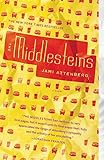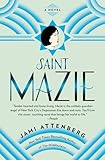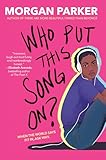Jami Attenberg, author of seven novels and recent New Orleans transplant, is a very considerate interviewee. I know everyone starts these little intros with gushing remarks; it just seems polite. But I was her third interview of the day. She asked which publication I was with, again? She told me she’d planned it out so that she would give slightly different answers to each interviewer, so it wouldn’t be just the same stuff on each platform—even though, she added, her publisher reminded her that “there’s nobody who reads all of them. Maybe your mom.” She said she’d once made a spreadsheet, after the breakout success of her novel The Middlesteins, in 2013, to track what she told each interviewer, and then her publisher told her this was insane and there were better things to do with her time. As a fellow listmaker, I was impressed and intrigued.
 We conducted this interview over the phone, me in my windowless office in Madison, Wisc., Jami in her house in New Orleans. Halfway through, there was a strange noise and she told me that her dog was humping her leg. Then he started eating dirt. We continued the interview anyway, discussing grief, families, Jewish books, and the post-production side of writing and publishing a novel. This conversation has been edited and condensed.
We conducted this interview over the phone, me in my windowless office in Madison, Wisc., Jami in her house in New Orleans. Halfway through, there was a strange noise and she told me that her dog was humping her leg. Then he started eating dirt. We continued the interview anyway, discussing grief, families, Jewish books, and the post-production side of writing and publishing a novel. This conversation has been edited and condensed.
The Millions: Where does your latest novel, All This Could Be Yours, fit in the line of your previous work? Is it a departure, or a continuation?

 Jami Attenberg: It feels different because it’s set in New Orleans. I was writing about a place I didn’t know very well, and through writing this, I got to know it better. My last two books, Saint Mazie and All Grown Up, were in New York, and then The Middlesteins was in Chicago. Even with Saint Mazie, which was set in the past, I didn’t feel insecure or nervous about capturing the city, because I had lived there for so long. So here was my new home, and it was just a real challenge to get to write about something different like that. Also, all my books have dysfunctional families, or families in them, but to have that be the primary focus of the book was something I hadn’t done that in a while. You know, I wrote The Middlesteins in 2010.
Jami Attenberg: It feels different because it’s set in New Orleans. I was writing about a place I didn’t know very well, and through writing this, I got to know it better. My last two books, Saint Mazie and All Grown Up, were in New York, and then The Middlesteins was in Chicago. Even with Saint Mazie, which was set in the past, I didn’t feel insecure or nervous about capturing the city, because I had lived there for so long. So here was my new home, and it was just a real challenge to get to write about something different like that. Also, all my books have dysfunctional families, or families in them, but to have that be the primary focus of the book was something I hadn’t done that in a while. You know, I wrote The Middlesteins in 2010.
TM: What kind of research did you do for the novel?
JA: I went to a lot of places. I wanted to know the landscape, not just of New Orleans but of Louisiana. I think it’s really easy now for people to just look up a bunch of stuff online, but when you really put yourself in a situation, I think, something’s always going to come out of it. I drove to a pecan farm in Alabama, and I was talking to somebody who worked there and I was like, can I walk around the farm? And she said no, it just rained last night, so there’s snakes everywhere. Which I never would have known in a million years, that that’s what happens after it rains on that farm. So it became, like, I’m definitely putting snakes in there! At this point, this is my seventh book, so I’m really in tune with how much I need to do my work, what I need to do in order to write things.
TM: You mentioned you hadn’t written a family novel in several years. All This Could Be Yours shares a lot of superficial similarities with The Middlesteins, but in many ways they’re also very different books.
JA: I think they’re very different books. A lot more happens in All This Could Be Yours, there’s just a much bigger plot. The Middlesteins is a novel, but it feels more like linked stories. Right? Each chapter is kind of its own compact thing. You could have pulled out any of those chapters, and read them and had a complete experience, whereas I think with All This Could Be Yours—some of the chapters could be excerpted, but they work best together.
TM: Something I really liked about the novel is the way the narrative floats in and out of the consciousnesses of different people. You have this claustrophobic family, and then these detours, these offshoots into other characters’ heads. So I was wondering how you came to that, if that was always part of the novel for you.
JA: The intention originally was that it would just be the four main characters. Whatever I intend to do when I start a book, though, I don’t want to say that it falls apart, but it definitely bends to whatever my instincts are. It’s good to have somewhat of a strategy going in, but also, especially with a first draft, I just kind of let my freak flag fly. Whatever’s going to show up is going to show up, and I’m just going to let it go. So these characters just, fairly insistently, demanded to be heard, and I just let them! But they weren’t as strong as they could have been initially.
I have an initial round of readers, and then I was getting notes from another, second tier of readers, and Laura van den Berg was part of that. She’s an incredible reader. She’s an incredible writer too, but she’s really good at giving notes. Very thoughtful. She said, I really think you need to lean in a little bit more to this kaleidoscopic vision. So I had them in there but I hadn’t fully—I knew they were there, but, sometimes you just need a nudge. So I went back and did another round where all these characters got tightened up a little bit.
It’s fun, right? Very fun and very playful, there’s a lot of little, for lack of a better word, tricks that I use in the novel. Times that I’m talking to the reader directly, or where these little characters show up. I’m definitely very playful and experimental with my structure—always. Every book needs to feel different. Even if the subject matter is dark, I still want it to be an entertaining ride.
TM: There’s a lot about criminality and bad men in this novel. Victor Tuchman, the patriarch, whose hospitalization provides an organizing structure to the novel, is so alluring to all the people around him. At one point, a friend of his wife, Barbra, says, “Isn’t there something so sexy about being married to a criminal?” Obviously, there’s a lot about Bad Men and Ugly Men going on right now. What is compelling about this kind of criminality, to you as a writer and to the characters in the novel?
JA: I mean, I personally am not interested in it. I’m not attracted to those kinds of people. What I was interested in was why Barbra was with Victor. This book was about understanding what men like that leave behind, and how it impacts families and communities. There’s a reason why you only see Victor for two seconds, you know. Because I could really give two shits about men like that. I’m done. I’ve heard them enough. I’ve heard enough talking from them. So I was interested in why—how he impacted people, and why people put up with him.
TM: The Tuchmans, like the Middlesteins, are Jewish. The older Tuchmans, especially, socialize and grow up in a space of Jewish community. Is it important to think about this book as a Jewish book?
JA: I think it is. But I definitely did not sit down and say, gonna write a Jewish book. It’s just who the characters were, how they showed up. Writing The Middlesteins, the fact that it was really embraced as a Jewish book was quite surprising to me. I was writing about a specific community, but I thought that they were, and I believe they are, a very universal family, and I feel the same way about these characters. It’s part of who they are, but in a way they could be lots of things.
But I’m waiting to hear the Jewish response to this book. I have one really big Jewish event I’m doing at the very end of my tour, at my mom and dad’s new temple in Florida. [Laughs.] There are enough characters in this book that aren’t Jewish, though, that it does feel like a bigger tableau. Whereas The Middlesteins was very claustrophobically—as it turns out—more Jewish than I thought it was.
TM: Did it feel different to do events for The Middlesteins in a Jewish space?
JA: Yeah. It’s weird because I’m not a practicing Jew, so I had not spent time in any sort of religious buildings. Anyway, I came out of doing all these events in a really interesting place, which was that I sort of embraced my Jewish cultural connections more within myself. I’ve lived in New York for so long, which is, like, the most Jewish place ever, so I didn’t really think about it too much. But then to go and talk to all these people about their families—often, that book triggered conversations about people’s struggles with health issues, or people in their lives who have had those struggles, so it ended up being an incredibly enriching experience for me – and an honor to talk to these people. So I have learned to just take whatever comes my way. Books are a place to put your feelings. I’m just happy when people give a shit! Really. Truly. And get something out of it.
TM: You said earlier that you’ve figured out, by now, pretty much what you need to start writing and get your work done. Does that extend to the publicity side of things?
JA: [Laughs.] I don’t really like it. I don’t think it’s healthy for a writer. I think most writers would agree with me that the hardest part of writing, or being a professional writer, is the actual publication. My first book came out in 2006, and I still remember what it was like when you weren’t counting on the Internet, and you weren’t counting on lists. You were waiting for reviews. And I’m still waiting on reviews, but now it’s like, if I’m not on this list or that list, you know, that’s what so many magazines and newspapers and websites are doing now. And I’m not knocking the list! Please! Put me on every single list! It’s just weird to see it. I’m just going to imagine that it’s really hard for people to break out these days, you know, it’s a real struggle to figure out how you promote your book, and how you get recognized. I have so much sympathy for all my fellow writers, and I try really hard to read as much as I can so I can talk about people’s books and promote things – and I don’t do it unless I really like something.
TM: Since you mention it, then, is there anything you’re excited about right now? What are you reading?



 JA: I just started reading Kate Manne‘s Down Girl: The Logic of Misogyny, and I’m very intrigued by it. Let’s see. I just read Nothing to See Here by Kevin Wilson and it was excellent, I really enjoyed it. A proper book. And I read Morgan Parker‘s YA novel, Who Put This Song On?, I enjoyed that, and also Mary H.K. Choi‘s Permanent Record, I always enjoy YA. I read and blurbed Jenny Boylan‘s Good Boy, I liked that, I thought it was very heartfelt.
JA: I just started reading Kate Manne‘s Down Girl: The Logic of Misogyny, and I’m very intrigued by it. Let’s see. I just read Nothing to See Here by Kevin Wilson and it was excellent, I really enjoyed it. A proper book. And I read Morgan Parker‘s YA novel, Who Put This Song On?, I enjoyed that, and also Mary H.K. Choi‘s Permanent Record, I always enjoy YA. I read and blurbed Jenny Boylan‘s Good Boy, I liked that, I thought it was very heartfelt.
But the true pleasure is about to come, in about a month or so, after most of the reviews are in—so I can stop worrying about that—and people will just be reading the book. Once you get to that it’s quite delightful. You’re hearing from people who really liked the book, who are getting in touch with you. The joy is about being read.
Back to your earlier question, the other thing I’ve noticed is that there’s an evolution in your relationship with your work. You have a relationship with the book when you write it, where it’s just yours. Then you get another relationship when you give it to your editor and you start working back and forth and getting copyedits and things like that. It becomes something slightly different and not 100 percent yours anymore, even though you’re doing most of the work on it. And then it gets read and it gets digested and people have questions and people may interpret it—not incorrectly, but maybe not as you would have desired, and that can be complicated. And then, about a year later, I have found that the book comes back to me, and it’s mine again. It’s been altered by all of these opinions, and these experiences, but I can sort of reclaim it for myself. So I look forward to that also, a year from now, when it’s just mine.









